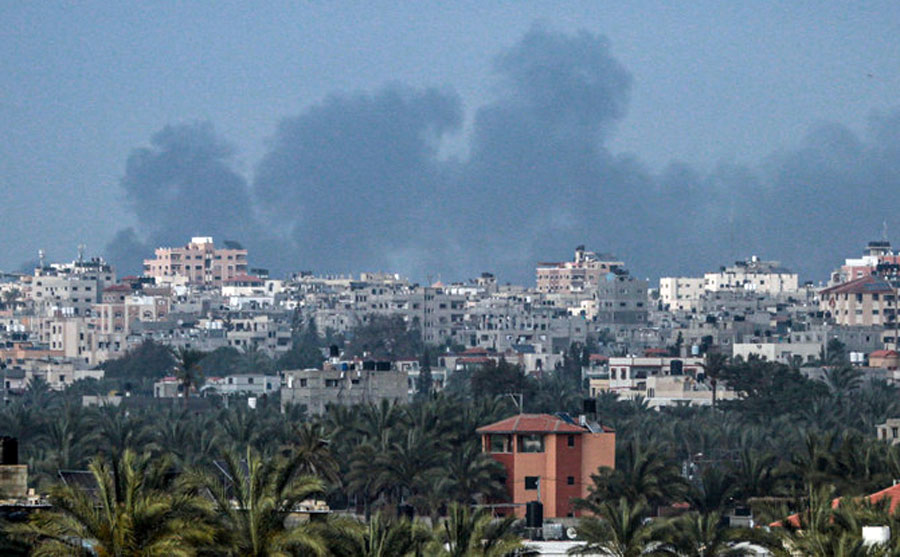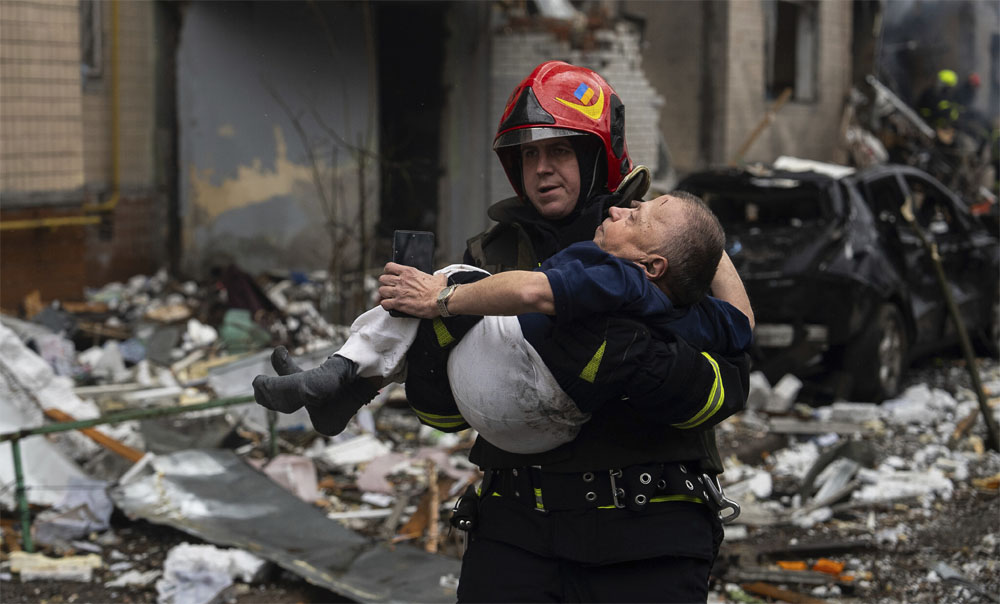International
Middle East crisis, Russian-Ukraine war may trigger gas crisis in Europe— German govt, others

Middle East crisis, Russian-Ukraine war may trigger gas crisis in Europe— German govt, others
NEW ORLEANS: The Head of Energy Policy Department, Federal Ministry for Economic Affairs and Climate Action, Germany, Stefan Rolle and the Head of Trading & Optimizing, Gasum, Jouni Liimatta, have said that the crisis in the Middle East and the Russian-Ukraine war may affect Liquefied Natural Gas (LNG) prices in Europe.
The stakeholders gave the explanation during a panel-led discussion at the 20th edition of the Americas Energy Summit.
The panel discussion was on the ‘role of LNG in providing energy security to Europe in the short and long-term.
Stefan said, “I think there are many possibilities that may be realised. For example, a drastic change in demand for energy in East Asia due to a quick recovery of the Chinese economy. Also, the disruptions of important critical infrastructure in some parts of the world not necessarily in Europe but also in other parts of the world.
“This could change the picture, and there are also difficulties which have to be faced and which we cannot foresee. So, they exist.”
Stafen said if Russian LNG had been banned in Europe, there would have been a spike in prices until equilibrium was found.
READ ALSO:
The crisis between Israel and Palestine had worsened the energy crisis in Europe which was induced by the Russian-Ukraine war.
Recall that in October last year, LNG prices spiked more than 40 per cent to $18.35 amid the Israel-Palestine war.
Liimatta said, “Unfortunately there has been a lot of war ongoing in the world in very critical places and I fear that if the Middle East crisis expands, the Russian-Ukraine war could expand as well. This could change the picture completely. So, I’m not seeing any positive surprises coming on.
“It is more pessimistic to me. If there are prices, it will be pessimistic. We are already seeing a couple of gas pipelines exploding or being damaged in Europe. Hopefully let’s say the Norwegian Continental Shelf Pipeline continues to Europe, but if something happens to those, we will have a huge crisis in Europe. Unfortunately, negative gas prices could happen.”
According to him, placing a ban on Russian LNG by European countries will take time due to challenges in individual countries.
Liimatta argued that although the Russian LNG contributes about 8 per cent of the whole gas supplies to Europe, it would take time for European countries to ban the commodity.
He said, “Realistically, even though the Russian LNG is only around 5-8 per cent of the whole gas supplies to Europe, it will take until 2025 or 2026 for it to be banned because that is when new LNG [productions will be going on into the market from US or Qatar.
“So, unfortunately, the Russian LNG will probably still come to Europe for another year or two.”
Middle East crisis, Russian-Ukraine war may trigger gas crisis in Europe— German govt, others
International
Gaza: Hamas studies new Israeli truce proposal, 32 more killed

Gaza: Hamas studies new Israeli truce proposal, 32 more killed
JEDDAH/GAZA STRIP: Palestinians in Rafah said on Saturday they were living in “constant terror” as Israel vows to push ahead with its planned assault on the south Gaza city flooded with displaced civilians.
The Israeli military has massed dozens of tanks and armored vehicles in southern Israel close to Rafah and hit locations in the city in near-daily airstrikes.
“We live in constant terror and fear of repeated displacement and invasion,” said Nidaa Safi, 30, who fled Israeli strikes in the north and came to Rafah with her husband and children.
Gaza’s Health Ministry said at least 34,388 people have been killed in the besieged territory during more than six months of war between Israel and Hamas militants.
The tally includes at least 32 deaths in the past 24 hours, a ministry statement said, adding that 77,437 people have been wounded in the Gaza Strip since the war broke out when Hamas militants attacked Israel on Oct. 7.
Early Saturday, an airstrike hit a house in Rafah’s Tel Sultan neighborhood, killing a man, his wife and their sons, ages 12, 10 and 8, according to records of the Abu Yousef Al-Najjar hospital’s morgue. A neighbor’s 4-month-old girl was also killed.
Ahmed Omar rushed with other neighbors after the 1:30 a.m. strike to look for survivors, but said they only found bodies and body parts. “It’s a tragedy,” he said.
An Israeli airstrike later Saturday on a building in Rafah killed seven people, including six members of the Ashour family, according to the morgue.
Five people were killed in the Nuseirat refugee camp in central Gaza overnight when an Israeli strike hit a house, according to officials at the Al-Aqsa Martyrs Hospital.
READ ALSO:
- 2027: Politicians plotting to undermine Tinubu’s support base — Arewa group
- Fuel sells for N2,500/litre black market as scarcity persists
- Coastal highway: Minister present as demolition of Landmark Beach begins
Elsewhere, Israeli forces shot and killed two Palestinian men at a checkpoint in the Israeli-occupied West Bank, the military said. It said the men had opened fire at troops stationed at Salem checkpoint near the city of Jenin.
Violence in the West Bank has flared since the war. The Ramallah-based Health Ministry says 491 Palestinians have been killed by Israeli fire.
Israel’s counterproposal
Hamas said it was studying Israel’s latest counterproposal for a ceasefire, a day after reports said a delegation from mediator Egypt was in Israel trying to jump-start stalled negotiations.
Israel’s foreign minister said that the Rafah incursion could be suspended should there be a deal to secure the release of Israeli hostages.
“The release of the hostages is the top priority for us,” said Israel Katz. “If there will be a deal, we will suspend the operation.”
The Egyptian delegation discussed a “new vision” for a prolonged ceasefire in Gaza, according to an Egyptian official, who spoke on condition of anonymity to freely discuss the developments.
It wasn’t immediately clear whether Israel’s proposal was directly related to the visit.
Khalil Al-Hayya, deputy head of Hamas’s political arm in Gaza, said it had “received the official Zionist occupation response to the movement’s position, which was delivered to the Egyptian and Qatari mediators on April 13.”
Negotiations earlier this month centered on a six-week ceasefire proposal and the release of 40 civilian and sick hostages in exchange for freeing hundreds of Palestinian prisoners in Israeli jails.
A separate Hamas statement said leaders from the three main militant groups active in Gaza discussed attempts to end the war. It didn’t mention the Israeli proposal.
The armed wing of Hamas also released video footage of two men held hostage in Gaza, identified by Israeli campaign group the Hostages and Missing Families Forum as Keith Siegel and Omri Miran.
Mediators are working on a compromise that will answer most of both parties’ main demands, which could pave the way to continued negotiations with the goal of a deal to end the war, the official said.
Hamas has said it won’t back down from demands for a permanent ceasefire and full withdrawal of Israeli troops.
Israel has rejected both and said it will continue military operations until Hamas is defeated and that it will retain a security presence in Gaza.
There is growing international pressure for Hamas and Israel to reach a ceasefire deal and avert an Israeli attack on Rafah, where more than half of Gaza’s 2.3 million people have sought refuge.
READ ALSO:
- Landmines kill 5 JTF members, others wounded on Borno highway
- Chelsea in dramatic come back dent Aston Villa top-four hope
- 5 Benin chiefs suspended for visiting Ooni of Ife
Israel has insisted for months it plans a ground offensive into Rafah, on the border with Egypt, where it says many remaining Hamas militants remain, despite calls for restraint including from Israel’s staunchest ally, the United States.
Egypt has cautioned an offensive into Rafah could have “catastrophic consequences” on the humanitarian situation in Gaza, where famine is feared, and on regional peace and security.
Tolerating Israeli abuses
Washington has been critical of Israeli policies in the West Bank. US Secretary of State Antony Blinken, who is expected in Israel on Tuesday, recently determined an army unit committed rights abuses there before the war in Gaza.
But Blinken said in an undated letter to US House Speaker Mike Johnson, obtained by The Associated Press on Friday, that he’s postponing a decision on blocking aid to the unit to give Israel more time to right the wrongdoing. Blinken stressed that overall US military support for Israel’s defense wouldn’t be affected.
The US has also been building a pier to deliver aid to Gaza through a new port. Israel’s military confirmed Saturday that it would be operational by early May.
The BBC reported the UK government was considering deploying troops to drive the trucks to carry the aid to shore, citing unidentified government sources. British officials declined to comment.
Another aid effort, a three-ship flotilla coming from Turkiye, was prevented from sailing, organizers said.
Student protests over the war and its effect on Palestinians are growing on college campuses in the US, while demonstrations continue in many countries.
Hamas sparked the war by attacking southern Israel on Oct. 7, with militants killing around 1,200 people, mostly civilians, and taking around 250 hostage. Israel says the militants still hold around 100 hostages and the remains of more than 30 others.
Gaza: Hamas studies new Israeli truce proposal, 32 more killed
Arab News
International
Ukraine receives bodies of 140 fallen soldiers from Russia

Ukraine receives bodies of 140 fallen soldiers from Russia
Ukraine has received the bodies of 140 soldiers killed while trying to defend the regions of Donetsk, Luhansk, Zaporizhzhya and Kherson from Russian attacks.
The authority responsible for prisoner-of-war matters said on Telegram on Friday that five bodies were from the Sumy section in northern Ukraine.
Russia has no Ukrainian territories under its control in this area; however, at the beginning of March, units of allegedly Russian volunteers fighting on the side of Ukraine made advances from the Sumy region into Russian territory.
READ ALSO:
- Nollywood veteran actor, Ogunjimi is dead
- Soldier dies while ‘rushing to rescue brother arrested by policemen’
- Labour shuts NSITF head office over staff salary cut
Once the identities of the dead have been established, they will be handed over to their relatives, the authority said.
The authority, known as the Coordination Headquarters for the Treatment of Prisoners of War, thanked the International Committee of the Red Cross for arranging the return.
Ukraine has been fending off a Russian invasion for over two years.
Despite the ongoing fighting, both sides regularly exchange the bodies of fallen soldiers and prisoners of war.
It is not yet known whether and how many dead soldiers Russia has received in return.
Ukraine receives bodies of 140 fallen soldiers from Russia
International
Weeks after Iran’s attack, Israel discovers another massive surface-to-surface missile

Weeks after Iran’s attack, Israel discovers another massive surface-to-surface missile
Weeks after missiles sent by Iran on April 14 rocked several parts of Israel, another debris of a surface-to-surface missile has been found in the southern part of the country.
According to the Israel Defense Forces (IDF), the debris that was found by hikers in southern Israel, has been successfully evacuated.
“The effects of Iran’s attack on Israel can still be seen weeks after it occurred.
READ ALSO:
- Many dead as building collapses in Kano
- Anxiety as dollar exchanges for N1,420/$ on parallel market
- Safety: NCAA to audit all domestic airlines, says Aviation minister
“Earlier today, our troops removed the debris of a surface-to-surface missile intercepted during the Iranian attack. At the beginning of the week, the debris was found by hikers in southern Israel.
A complex removal, the process was made possible through advanced preparation by the Home Front Command and assistance from the IAF. During the process, the missile debris was cleared of hazardous materials, ” the IDF said in a post on Friday.
This is not the first missile discovered in the south since the attack. Similar missiles were discovered nearby in the Dead Sea area immediately after the major attack that Tehran launched against Israel, which included more than 300 suicide drones, cruise missiles, and ballistic missiles.
Weeks after Iran’s attack, Israel discovers another massive surface-to-surface missile
-

 Entertainment13 hours ago
Entertainment13 hours agoBREAKING: Popular Gospel singer Morenikeji ‘Egbin Orun’ is dead
-

 Opinion2 days ago
Opinion2 days agoWhy Yahaya Bello does not represent the youth – Farooq Kperogi
-

 metro2 days ago
metro2 days agoEight illegal security guards arrested in Anambra
-

 metro2 days ago
metro2 days agoSoldier dies while ‘rushing to rescue brother arrested by policemen’
-

 metro2 days ago
metro2 days agoNigerian Army loses another major to bandits’ attack in Katsina
-

 Entertainment2 days ago
Entertainment2 days agoNollywood veteran actor, Ogunjimi is dead
-

 News2 days ago
News2 days agoLabour shuts NSITF head office over staff salary cut
-

 International2 days ago
International2 days agoNigerian man kills wife months after relocating to UK






















